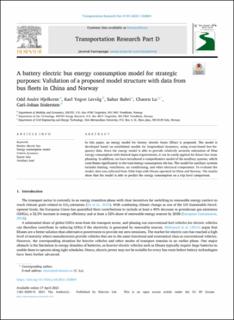A battery electric bus energy consumption model for strategic purposes: Validation of a proposed model structure with data from bus fleets in China and Norway
Peer reviewed, Journal article
Published version
Date
2021Metadata
Show full item recordCollections
- Publikasjoner fra CRIStin - SINTEF AS [5802]
- SINTEF Community [2248]
- SINTEF Energi [1764]
Original version
10.1016/j.trd.2021.102804Abstract
In this paper, an energy model for battery electric buses (Ebus) is proposed. The model is developed based on established models for longitudinal dynamics, using event-based low-frequency data. Since the energy model is able to provide relatively accurate estimation of Ebus energy consumption with limited input requirements, it can be easily applied for future bus route planning. In addition, we have introduced a comprehensive model of the auxiliary systems, which contributes significantly to the total energy consumption ofa bus. The model for auxiliary systems includes heating, ventilation, air conditioning, and other electrical components. To evaluate the model, data was collected from 3266 trips with Ebuses operated in China and Norway. The results show that the model is able to predict the energy consumption on a trip level comparison. Keywords Battery electric busEnergy consumption modelVehicle dynamicsSparse dataAuxiliary load

